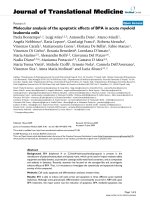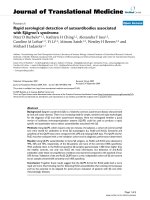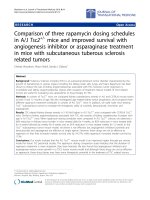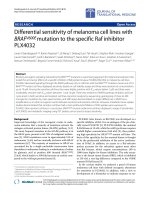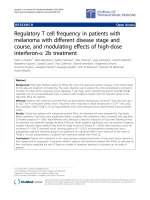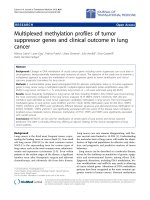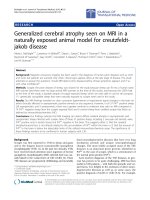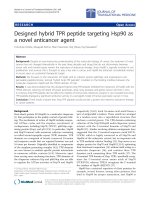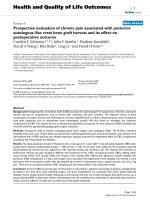báo cáo hóa học:" Simultaneous bicompartmental bucket handle meniscal tears with a clinically competent Anterior Cruciate Ligament" potx
Bạn đang xem bản rút gọn của tài liệu. Xem và tải ngay bản đầy đủ của tài liệu tại đây (523.53 KB, 3 trang )
CAS E REP O R T Open Access
Simultaneous bicompartmental bucket handle
meniscal tears with a clinically competent
Anterior Cruciate Ligament
Jonathan Wright
1*
, Chiharu Tamura
1
, Iain Findlay
2
, Aria Daneshfar
3
Abstract
Bucket handle meniscal tears (BHMT) of the knee occur infrequently (approximately 10% of meniscal injuries).
Simultaneous, bicompartmental BHMT are extre mely rare. Previously, these have only been reported in association
with a ruptured anterior cruciate ligament (ACL). The pathomechanism of this injury was thought to be due to the
lack of knee stability following the ACL injury. We present a case of a 38 year old male patient with bicompart-
mental BHMT with a clinically competent ACL. This highlights the need for clinical and radiological suspicion of
simultaneous BHMTs even in the presence of an intact ACL.
Background
Knee menisci are important structures in lo ad transmis-
sion, shock absorption and joint stabilization[1]. Injuries
to the menisci often r esult from a forceful twisting
movement of the knee whilst weight bearing. A bucket
handle meniscal tear (BHMT) is a sub group of the
meniscal injuries, which consist of a ve rtical or oblique
longitudinal tear with an attached fragment displaced
away from the periphery of the meniscus [2]. BHMT
occurs more commonly in the less mobile, medial
meniscus [2]. There have been 3 case reports of simulta-
neous bicompartmental BHMT all of which were asso-
ciated with torn ACL [3-5]. We presen t an unusual
pattern of this meniscal injury: bicompartmental BHMT
with a clinically competent ACL.
Case History
A 38 year old man presented with persistent instability
and swelling to his left knee following a twisting injury,
whilst dancing. There was no previous history of injury
or knee symptoms.
On examination, he was tender along the medial and
lateral joint lines. His A CL was clinically intact and Mc
Murray’s test was positive for both menisci.
MRI of the left knee showed features of a bucket han-
dle tear in both medial and lateral meniscus with an
intact ACL (Figures 1, 2).
He underwent left knee arthroscopy, which confirmed
bucket handle meniscal tears in both medial and lateral
compartment and 50%, partial rupture of ACL. Examina-
tion under anaesthesia demonstrated clinical competence
of the ACL. Partial meniscectomy in both compartments
was performed (Figures 3, 4).
He was reviewed in the clinic 6 weeks after the arthro-
scopy and reported an uneventful recovery.
Discussion
In BHMTs, a longitudinal split extending from the
posterior horn of the meniscus to the anterior horn
all ows the inner segment to displa ce and this resembles
a handle. The non displaced portion of the meniscus
has the appearance of a bucket[6].
BHMTs are reported to occur in approximately 9-24%
of meniscal lesion s[7]. Only three cases of bicompart-
mental BHMT have been reported in the past, all of
which were associated with ACL tears [3-5]. These
lesions typically occur in young age group, usually fol-
lowing a significant trauma with sudden impact to split
the meniscus [3]. There is a significant male preponder-
ance for the occurrence of meniscal bucket-handle tears
[8] and three times more in the medial menisci com-
pared to the lateral menisci [2] as the medial meniscus
is less mobile than the lateral meniscus[5].
* Correspondence:
1
CT1 Orthopaedics, University Hospital Lewisham, London, UK
Full list of author information is available at the end of the article
Wright et al. Journal of Orthopaedic Surgery and Research 2010, 5:68
/>© 2010 Wright et al; licensee BioMed Central Ltd. This is an Open Access article distributed under the terms of the Creative Commons
Attribution License ( which permits unre stricted use, distribution, and reproduction in
any medium, provided the original work is properly cited.
Clinically, patients may present with a lack of full
extension, history of knee locking or completely locked
knee [9,10]. The locked knee occurs in medial BHMTs as
well as in the lateral BHMT with similar percentage [10].
Two main modalities of investigation are MRI and
knee arthroscopy. Overall, sensiti vity and positive
predictive value of MR imaging for the detection of
meniscal bucket-handle tears were calculated as 90% [8].
There are seve ral signs of BHMT describ ed on MRI
including absent bow tie signs, flipped meniscal signs or
double delta sign and double PCL in sagittal views,
coronal truncation sign and fragment in intercondylar
notch in coronal views [1-3,6].
The menisci, in particular the medial, provide a role in
stability of the knee particularly in association with ACL
deficiency. This is an important consideration as the
previous reports of bicompartmental BHMT have all
been associated with ACL deficiency. The forces
through the medial meniscus have been shown to
increase by 197% at 60 degrees of flexion following loss
of the ACL [11]. Cadaveric studies have demonstrated
sig nificantly increased antero-poster ior tibial translation
following partial or total medial meniscectomy in the
ACL deficient knee, while the stability is not affected if
the ACL remains intact [12,13]. The lateral meniscus
has less contribution to stability, with little increase in
tibial translation following meniscectomy [14].
Figure 1 T2 weighted MRI image demonstrating intact anterior
cruciate ligament.
Figure 2 T2 weighted MRI image demonstrating lateral
meniscal tear; “Absent bow tie sign”.
Figure 3 Arthroscopic images of medial meniscus bucket
handle tear.
Figure 4 Image of arthroscopic debridement of lateral
meniscal tear.
Wright et al. Journal of Orthopaedic Surgery and Research 2010, 5:68
/>Page 2 of 3
Our patient underwent arthroscopic meniscectomy.
One of the previously reported cases of bicompartmental
BHMT with ACL deficiency offered a partial meniscect-
omy and arthroscopically assisted ACL reconstruction
with bone-patellar reconstruction, as the tears were not
reparable[5]. The meniscal lesions could be managed by
reparative surgery if there is a potential to heal post
operatively. Thus, factors to co nsider for repair operation
are: acute injury, rather t han degenerative, size of the
lesion and vascular supply to the affected part of menisci
(the closer the lesion to the meniscosynovial junction,
the better the vascularization) [1].
Our case highlights the need for clinical and radiologi-
cal suspicion of simultaneous bicompartmental bucket
handle tears even in the presence of an intact ACL and
without a history of significant trauma.
Consent
Written informed consent was obtained from the patient
for publication of this case report and accompanying
images. A copy of the written consent is available for
review by the Editor-in-Chief of this journal.
Author details
1
CT1 Orthopaedics, University Hospital Lewisham, London, UK.
2
Orthopaedic
SpR, University Hospital Lewisham, London, UK.
3
Consultant Orthopaedic
Surgeon, University Hospital Lewisham, London, UK.
Authors’ contributions
JW and CT performed the literature search and drafted the article. JW
performed the subsequent revisions. IF conceived the article and provided
guidance on design and corrections. AD supervised, co-ordinated and
provided further advice on revisions. All authors read and approved the final
manuscript.
Competing interests
The authors declare that they have no competing interests
Received: 15 June 2010 Accepted: 15 September 2010
Published: 15 September 2010
References
1. Thoreux Patricia, Réty Frédérique, Nourissat Geoffroy, Rivière Xavier,
Safa Patrick, Durand Sébastien, Masquelet Alain-Charles: Bucket-Handle
Meniscal Lesions: Magnetic Resonance Imaging Criteria for Reparability.
Journal of Arthroscopic and Related Surgery 2006, 22(9):954-961.
2. Wright DH, De Smet AA, Norris M: Bucket-handle tears of the medial and
lateral menisci of the knee: Value of MR imaging in detecting displaced
fragments. AJR Am J Roentgenol 1995, 165:621-625.
3. Bungnone AN, Ramnath RR, Davis SB, Sedaros R: The quadruple cruciate
sign of simultneous bicompartmental medial and lateral bucket-handle
meniscal tears. Skeletal Radiol 2005, 34 :740-744.
4. Brammer H, Sover E, Erickson S, Stone J: Simultaneous identification of
medial and lateral bucket-handle tears: the Jack and Jill lesion. AJR Am J
Roentgenol 1999, 173:860-861.
5. Cetik O, Cirpar M, Eksioglu F, Uslu M: Simultaneous bucket handle tear of
both medial and lateral menisci of a knee with chronic anterior cruciate
ligament deficiency. Knee Surg Sports Tramumatol Arthrosc 2006,
14:356-359.
6. Singson RD, Feldman F, Staron R, Kiernan H: MRI imaging of displaced
bucket-handle tear of the medial meniscus. AJR 1991, 158:121-124.
7. Dorsay TA, Helms CA: Bucket-handle meniscal tears of the knee:
Sensitivity and specificity of MRI signs. Skeletal Radiol 2003, 32:266-272.
8. Aydingoz Ustun, Ahmet KFirat, Atay OAhmet, Doral MNedim: MR imaging
of meniscal bucket-handle tears: a review of signs and their relation to
arthroscopic classification. European Radiology 2003, 13(3):618-25.
9. Helms CA, Laorr A, Cannon WD Jr: The absent bow tie sign in bucket-
handle tears of the menisci in the knee. AJR Am J Roentgenol 1998,
170:57-61.
10. Shakespeare DT, Rigby HS: The bucket -handle tear of the meniscus.
Journal of Bone and Joint Surgery 1983, 65:383-386.
11. Allen CR, Wong EK, Livesay GA, Sakane M, Fu FH, Woo SL: Importance of
the medial meniscus in the anterior cruciate ligament-deficient knee.
J Orthop Res 2000, 18:109-115.
12. Levy IM, Torzilli PA, Warren RF: The effect of medial meniscectomy on
anterior-posterior motion of the knee. J Bone Joint Surg Am 1982,
64:883-888.
13. Shoemaker SC, Markolf KL: The role of the meniscus in the anterior-
posterior stability of the loaded anterior cruciate- deficient knee: Effects
of partial versus total excision. J Bone Joint Surg Am 1986, 68:71-79.
14. Levy IM, Torzilli PA, Gould JD, Warren RF: The effect of lateral
meniscectomy on motion of the knee. J Bone Joint Surg Am 1989,
71(3):401-6.
doi:10.1186/1749-799X-5-68
Cite this article as: Wright et al.: Simultaneous bicompartmental bucket
handle meniscal tears with a clinically competent Anterior Cruciate
Ligament. Journal of Orthopaedic Surgery and Research 2010 5:68.
Submit your next manuscript to BioMed Central
and take full advantage of:
• Convenient online submission
• Thorough peer review
• No space constraints or color figure charges
• Immediate publication on acceptance
• Inclusion in PubMed, CAS, Scopus and Google Scholar
• Research which is freely available for redistribution
Submit your manuscript at
www.biomedcentral.com/submit
Wright et al. Journal of Orthopaedic Surgery and Research 2010, 5:68
/>Page 3 of 3

